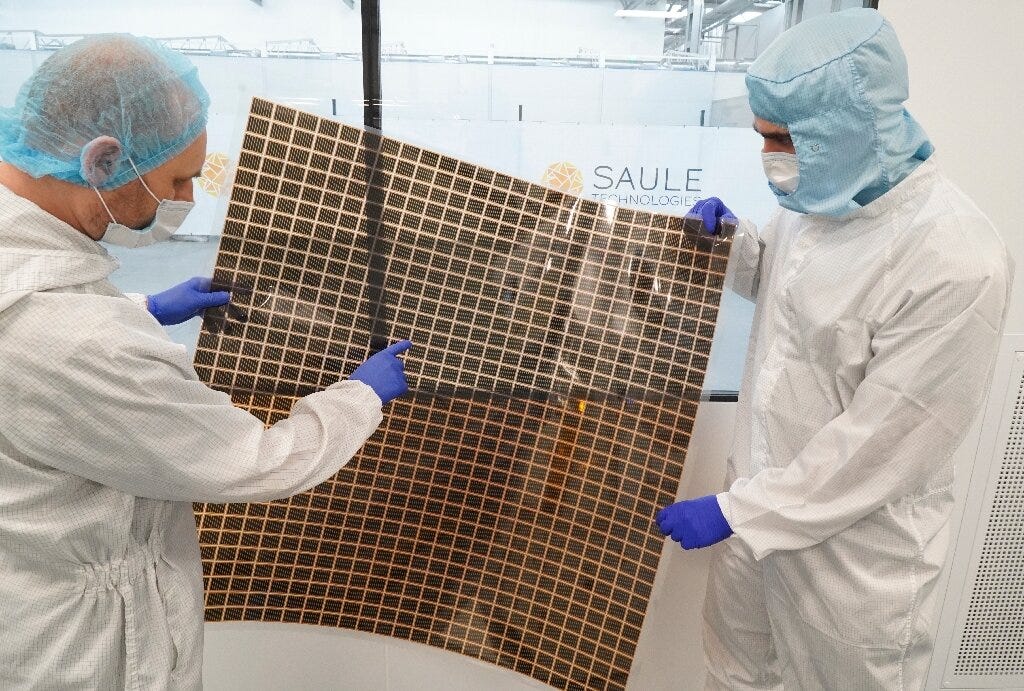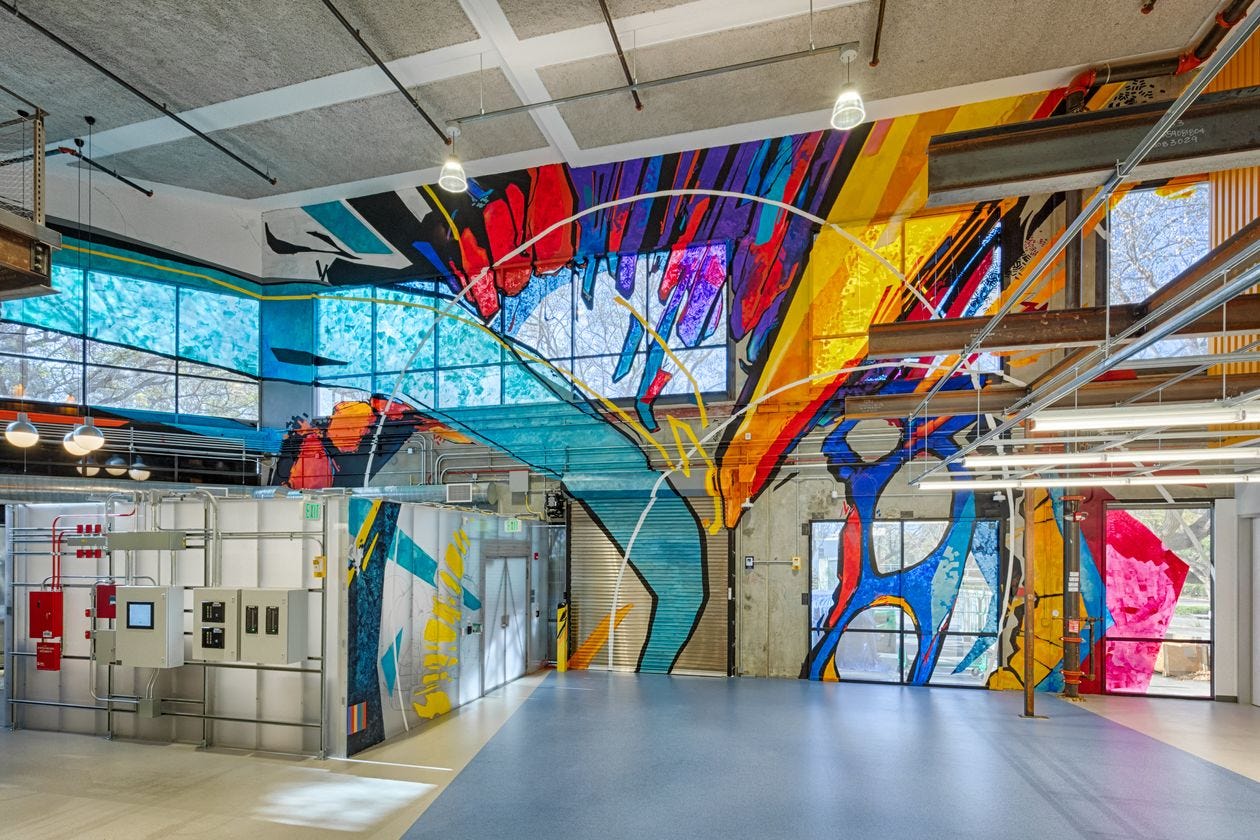Greetings!
Here’s your weekly wrap of the latest technology, innovation, and finance news.
▶️ Streaming
WIRED wrote about the Roku-YouTube feud and the value being generated by knowing what you’re watching.
Roughly three-quarters of US households have an internet-connected TV, either a smart TV or one connected to a plug-in device like Roku or Amazon Fire. This means millions of people across the US have agreed to some form of online tracking of their viewing behavior. This data is so valuable that the entire smart TV ecosystem revolves around its collection.
? Renewables
Polish company Saule Technologies has opened the world’s first industrial production line of solar panels made using perovskite solar cells. Founder Olga Malinkiewicz developed a novel processing method that reduces the cost of production back in 2013 while still a PhD student, which led to an article in the journal Nature. The company is now preparing to launch on the Warsaw Stock Exchange.
The company, whose team numbers 70 people from 15 countries, has received funding from Poland’s green energy leader Columbus Energy and multimillionaire Japanese investor Hideo Sawada.
 Matt Ferrell looks at what’s happening in the
Matt Ferrell looks at what’s happening in the
? Batteries
Ford is teaming up with South Korea’s SK Innovation to build EV batteries in the US.
With millions of electric cars coming, Science looks at what happens to all the dead batteries.
China is tightening its grip on the global supply of processed manganese, a rising star in battery metals.
High-purity forms of manganese have increasingly become crucial for battery-powered automobiles, touted by Volkswagen AG and Tesla Inc. in recent months as a viable replacement for other, more-expensive battery ingredients.
Brisbane battery companies made the news last week. Li-S Energy is developing a new lithium-sulphur battery that they believe could eventually lead to electric cars with a range of 1,000-kilometres, while Graphene Manufacturing Group is developing graphene aluminium-ion battery cells that they claim can charge up to 60 times faster than the best lithium-ion cells.
“We have achieved a significant innovation breakthrough with our Li-S battery technology at a time when the world is demanding better batteries and more efficient energy storage devices,” said Dr. Lee Finniear, CEO of Li-S Energy Limited.
New cement-based batteries may turn buildings into massive power storage facilities, assuming they can scale up from this proof of concept (see the paper).
? Blockchain and Crypto
China banned financial institutions and payment companies from providing services related to cryptocurrency transactions.
China has banned crypto exchanges and initial coin offerings but has not barred individuals from holding cryptocurrencies.
Bitcoin miners are giving new life to old fossil-fuel power plants (in the same way some argue Bitcoin encourages renewables development).
Across America, older fossil-fuel power plants are shutting down in favor of renewable energy. But some are getting a new lease on life—to mine bitcoin. In upstate New York, an idled coal plant has been restarted, fueled by natural gas, to mine cryptocurrency. A once-struggling Montana coal plant is now scaling up to do the same.
⚙️ Mobility
TuSimple says its self-driving trucks shaved 10 hours off a 24-hour run.
The Mayflower Autonomous Ship, an autonomous, crewless, solar-powered marine research vessel developed by IBM, is getting ready to sail across the Atlantic Ocean in the weeks ahead.
It’ll work with scientists and other autonomous vessels to gather information on issues like global warming, micro-plastic pollution and marine mammal conservation.
 Bloomberg Quicktake looks at Hyperloops in this 19-minute video. It discusses the theoretical network effects associated with them and why they’re different from existing high-speed Maglev trains.
Bloomberg Quicktake looks at Hyperloops in this 19-minute video. It discusses the theoretical network effects associated with them and why they’re different from existing high-speed Maglev trains.
“Fast is what we just sort of take for granted in the hyperloop world. It’s the network effects that really deliver the benefit, and that opens up a completely different scale of economic opportunity.”
? Finance
Squarespace, a company that makes it easy to build websites, went public through a direct listing. The company was valued at $6.7 billion by the end of the week.
Oatly, a company that makes an alternative to dairy milk based on oats, also listed. Its shares soared 30% on the first day.
The offering comes as money is flooding into the food tech space, with investors eager to catch a ride on the next Beyond Meat — the vegan food company valued at about $6.6 billion by public investors. And investors have put a heightened focus on companies like Oatly that say they meet environmental, social and governance standards.
? Gaming
Netflix is getting into gaming.
The streaming company is looking to hire an executive to lead an “expansion” into gaming, the Information reported today. The report added that Netflix has spoken to “veteran game industry executives” about boosting its investment in the space.
Film director JJ Abrams is also getting into gaming.
Bad Robot Games, the game division of JJ Abrams’ Bad Robot entertainment company, has raised more than $40 million to build games that are “as compelling to watch as they are to play.”
? Virtual and Augmented Reality
Snap announced their new Spectacles AR glasses that allow you to overlay digital objects onto the real world. They also bought a component supplier for augmented reality glasses, WaveOptics, for around $500 million.
? Health
A first-of-its-kind study shows how gene-edited immune cells can help the body more effectively fight cancer (see the paper).
“Every ‘obstacle course’ within a tumor is slightly different, but there are some similarities. After engineering these immune cells, we found that they moved through the tumor almost twice as fast no matter what obstacles were in their way.”
Scientists created lab-grown mini hearts that beat like the real thing (see the paper).
These are human “minihearts,” the first to be created in the lab with clearly beating chambers. The miniature organs, or organoids, mimic the working heart of a 25-day-old human embryo and could help unravel many mysteries—including why babies’ hearts don’t scar after they experience a heart attack.
? Augmented Humans
A paralysed man received a brain-computer interface (BCI) implant that lets him feel what his remotely-controlled robotic hand is doing (see the paper).
But once the researchers gave him touch feedback, he absolutely kicked ass, doubling his speed at performing tasks. It’s the first time a BCI for a robotic prosthetic has integrated motion commands and touch in real time. And it’s a big step toward showing just how BCIs might help circumvent the limits of paralysis.
Using a robotic “third thumb” can alter the brain’s representation of the hand (see the paper).
Professor Makin (UCL Institute of Cognitive Neuroscience), lead author of the study, said: “Body augmentation is a growing field aimed at extending our physical abilities, yet we lack a clear understanding of how our brains can adapt to it. By studying people using Dani’s cleverly-designed Third Thumb, we sought to answer key questions around whether the human brain can support an extra body part, and how the technology might impact our brain.”
Blackrock Neurotech, a brain-computer interface (BCI) company that competes with Elon Musk’s Neuralink, has raised $10 million in a round that included Peter Thiel.
“There are human patients using our implants and technology already to accomplish things directly with their minds that were unimaginable 10 years ago,” said Gerhardt, who met his electrical engineer co-founder Florian Solzbacher at boarding school in Wales three decades ago.
⚛️ Quantum Mechanics
Researchers established the first entanglement-based quantum network (see the paper).
A team of researchers from QuTech in the Netherlands reports realization of the first multi-node quantum network, connecting three quantum processors. In addition, they achieved a proof-of-principle demonstration of key quantum network protocols. Their findings mark an important milestone towards the future quantum internet and have now been published in Science.
Google unveiled their Quantum AI campus. They aim to build a commercial-grade quantum computer by 2029.
“We are at this inflection point,” said Dr. Neven, who has been researching quantum computing at Google since 2006. “We now have the important components in hand that make us confident. We know how to execute the road map.”

? Artificial Intelligence
An AI call centre automation company, Asapp, raised $120 million at a $1.6 billion valuation.
Founded in 2014, Asapp, which claims to have the largest collection of Ph.D. students studying machine learning-powered customer experiences, applies what it calls “self-learning” techniques to solve challenges without rules programming, working to identify opportunities to add to micro-automations that might help call center agents. The company focuses on improving enterprise performance with advances in AI that augment human activity and automate workflows.
FlawlessAI is a startup that generates believable lip-syncing to match dubbing in movies (see the video).
The tool studies how actors move their mouths and swaps the movements out according to the dubbed words in different languages, making it seem like Tom Hanks can speak Japanese or Jack Nicholson is fluent in French.
Google released the fourth version of their TPU AI Chip.
“This is the fastest system we’ve ever deployed at Google and a historic milestone for us,” Pichai said. Top supercomputers have yet to reach an exaflop, but the TPU V4 pod isn’t really in their league, because it calculates with lower-precision numbers than scientific supercomputers.
Google also launched Vertex, a fully managed cloud AI service.
Andrew Moore, vice president and general manager of cloud AI and industry solutions at Google Cloud, said the goals of Vertex AI were to remove orchestration burdens from data scientists and engineers and “create an industry-wide shift that would make everyone get serious about moving AI out of pilot purgatory and into full-scale production.”
? Advanced Materials
Researchers have discovered a new type of atomically thin carbon material that isn’t graphene (see the paper).
“These stripes could be used as conducting wires in future carbon-based electronic devices.” said professor Michael Gottfried, at University of Marburg, who leads the team who developed the idea. The lead author of the study, Qitang Fan from Marburg, continues, “This novel carbon network may also serve as a superior anode material in lithium-ion batteries, with a larger lithium storage capacity compared to that of the current graphene-based materials.”
? App Economy
Apple CEO Tim Cook took the stand in the Epic vs Apple battle over the App Store.
The tone of her questions raised the possibility of a split ruling, in which the judge turns down Epic’s main requests but also gives developers the ability to advertise cheaper digital content prices on their external websites inside their apps.
⚡ Other Snippets
Uber and Lyft drivers in California will be required to phase in electric vehicles into their fleets starting in 2023.
The air board’s mandate calls for 2% of miles driven by the ride-hailing companies to be in electric vehicles, ramping up to 90% in 2030.
Crime and neighbourhood watch app Citizen plans to expand into providing on-demand private security forces.
“The broad master plan was to create a privatized secondary emergency response network,” one former Citizen employee told Motherboard. Motherboard granted multiple sources anonymity to protect them from retaliation from the company.
Researchers can now see atoms at record resolution (see the paper).
The resolution is so fine-tuned, the only blurring that remains is the thermal jiggling of the atoms themselves.
Virgin Galactic completed its third successful suborbital space flight.
Have a great week,
Thomas




